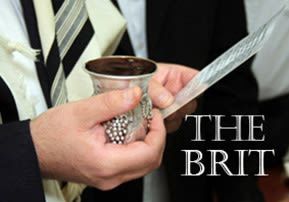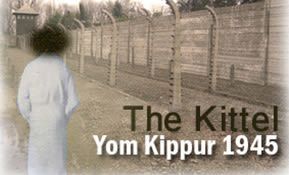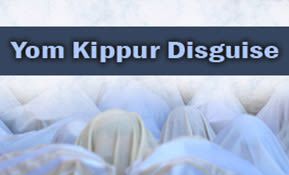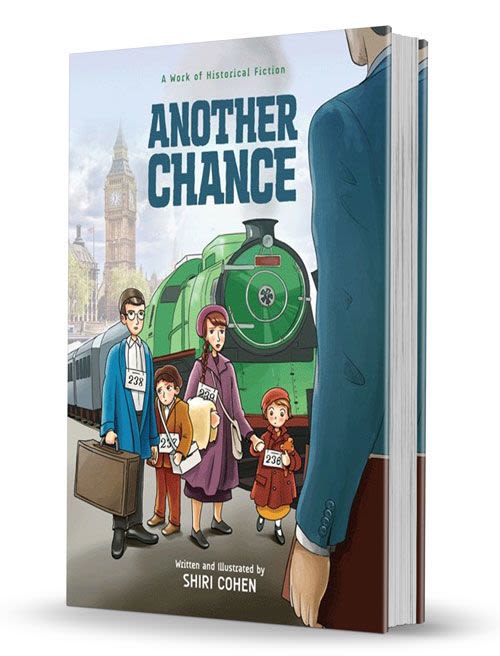
The Brit
"In your blood you shall live." How very appropriate these words seemed to Perele when they were recited at her son's brit. Would she and her child live...

Each generation faces its own, unique challenge. These two narratives focus on the relationship between these challenges. This story was written over five years ago.
This Shabbats, at eleven o’clock in the morning, my grandson became a member of the Jewish nation. This Shabbats, he was also given his name, a name, I hope, that he will bear proudly for the next 120 years.
Little Asher was named after his grandfather, my father. He is the first baby in the family to be given that name. And his father — my son — Alexander Mendel, was named after my grandfather; my father’s father, Asher’s father. In another thirteen years, little Asher will be called to the Torah with the same name that was used to call my father to the Torah: Asher ben Alexander Mendel.
But my father did not save his Jewish name for the synagogue. He used it wherever he went; he was probably the only Asher living in Northern California. He was so proud of his name that he had it written on his car’s license plate. Just like the Jews in Egypt kept their Jewish names, my father continued to use his Jewish name in the predominantly gentile culture of Northern California.
The Jews were redeemed from Egypt was because they did not change their Jewish names. Although they were immersed in a foreign culture, they maintained their identity, remembering that they were Jews and not gentiles.
Certainly every time a teacher or friend would ask, "Asher? What kind of name is that?” I would be forcefully reminded that I, too, am part of a separate culture. Perhaps it was the merit of my father’s Jewish name that gave me the courage to make my spiritual journey to Yerushalayim.
* * *
The following narrative is based on a true story:
Perele could feel the cool air whipping against her face. It felt salty as it mingled with the tears that had been streaming down her cheeks. So much had happened in the last few weeks, and now, she had finally been able to make a bris for her firstborn son. Her little Moishele was now a full-fledged Jew. Just two weeks ago, that knowledge would have filled her with joy, but now, everything was different, so very different.
Just over a week ago Perele had been a young married woman, anxiously awaiting her imminent confinement. Every night, until the wee hours of the morning, she and her husband would discuss what to name their as yet unborn child. If it was a girl, she would be named Sima, after Perele’s late mother, who had passed away almost a year earlier. If it was a boy, there would be several names to choose from. Neither of them had imagined, in their worst nightmares, that their firstborn son would be named Moshe ben Moshe, after his very own father.
Perele went into labor on the very same day that the Germans attacked the Ukraine. Her shrieks were drowned by the sounds of the low-flying airplanes and the bombs that destroyed half of their small town. Theirs was one of the first towns to be conquered, and little Moishele was probably the first baby to be born under the German occupation.
The day before the bris, Perele’s husband, Moshe, had come into her room to tell her that he, together with the other able-bodied Jewish men of the village, were instructed to report to work. They were told not to take any clothing with them, only shovels and spades. The Germans promised that they would return home by nightfall.
When Moshe, together with the other men of the village, marched into the forest, he never dreamed that the Germans were taking him there to dig his own grave. One of the younger women had secretly followed the group into the forest. She had hid in the dense bushes near the clearing and watched as her husband, together with all the other young men of the village, dug a huge pit — only Heaven knew for what purpose.
It was only when they were ordered to undress and stand at the edge of the pit that they realized that they would never return to their loved ones — but by then it was too late.
The young woman watched as the German soldiers murdered her husband, together with all the others. Half crazed with grief and terror, she ran back to tell the women of the village that their husbands had been killed. Now only old men, women and children remained in the village.
"In your blood you shall live." How very appropriate these words seemed to Perele when they were recited at her son’s brit. Would she and her child live despite the blood that had just been shed, the blood of circumcision?
That morning, she told her mother-in-law the plan she had formulated the previous night, as she tossed and turned in bed. She would take her baby and go into hiding. With her typical Ukrainian features, she hoped that she would be able to pass as one of the many young women searching for a way to sustain themselves until the war ended.
"You are crazy," her best friend had told her that morning. "Now, at a time like this, when being a Jew is a death sentence, you are going to circumcise your son? The minute you’re found out, you’ll be put to death. It’s a matter of pikuach nefesh, life and death."
But Perele refused to listen. The day before she left her home, disguised as a Russian peasant, she brought her child into the covenant of our father Avraham (Abraham).
“In your blood you shall live." Perele heard the words, but there was no way she could possibly know that from the blood of this circumcision she would be granted the gift of life.
Little Moishele was less than one month old when he developed a high fever. Perele was frantic; the child needed medical attention, but a visit to a doctor would spell death for both her and her young son.
Perele cautiously began to inquire about the different doctors in the area. She finally found one who was known for her compassion toward her patients — as well as for her intense hatred of the Germans.
Perele handed the doctor her infant, and, with a silent prayer, waited for the examination to begin. The doctor undressed little Moishele. In total silence she pointed at the baby’s brit.
Taking a deep breath, the doctor turned to Perele and asked, "Why?" No explanation was necessary.
Although Perele had never articulated her thoughts, her pure faith was so deeply ingrained that the words seem to take on a life of their own. "My God," she told the doctor, "commanded me to circumcise my son on the eighth day. I must obey Him. And He will do whatever He must do."
The doctor was so impressed with the purity and depth of Perele’s faith that she endangered her own life to find a safe hiding place for Perele and her baby — a safe hiding place that ultimately saved their lives.
There were many more miracles and escapes until the war ended. After the war, Perele moved to America with her little Moishele. There she remarried and raised a beautiful family. All of her children and grandchildren are proud Torah-observant Jews.
"In your blood you shall live." These words refer to both the blood of the brit milah and of the Pesach offering that were performed with tremendous mesirut nefesh, self-sacrifice, on the evening prior to the Jews’ exodus from Egypt. It was in the merit of these two mitzvot that the Jews left the darkness of Egypt and were granted the ultimate freedom of Torah.
Sometimes, however, it’s our own mesirut nefesh, our own "blood", that brings us life. Every generation has a different nisayon, a different test of mesirut nefesh. For the Jews in Mitzrayim it was performing those two mitzvot that tipped the scales in favor of eternal life. For a young woman in Europe it was circumcising her son despite the danger involved. For my father it was using his Jewish name, despite the prevalent gentile culture.
Each generation has its own unique nisayon, and each generation has its own unique mesirut nefesh. But, ultimately, it is our own mesirut nefesh, done without fanfare and with a pure heart, that will imbue our children with the courage to succeed in their own spiritual journeys.
(More of Debbie Shapiro’s stories can be found in Bridging the Golden Gate)








Tell us what you think!
Thank you for your comment!
It will be published after approval by the Editor.